六年级上册英语期末复习资料
- 格式:docx
- 大小:16.21 KB
- 文档页数:5
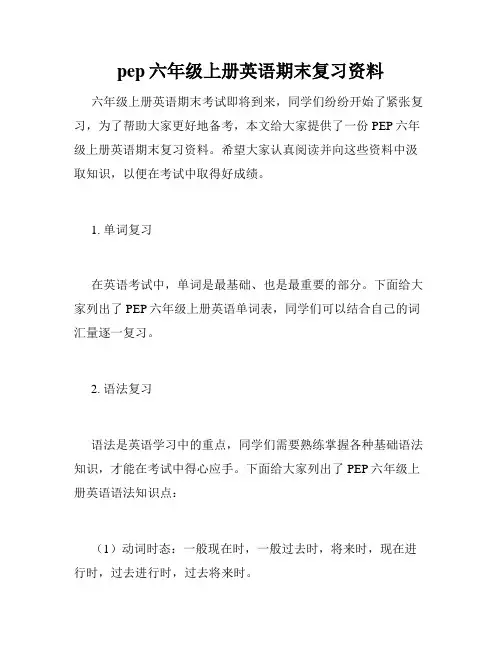
pep六年级上册英语期末复习资料六年级上册英语期末考试即将到来,同学们纷纷开始了紧张复习,为了帮助大家更好地备考,本文给大家提供了一份PEP六年级上册英语期末复习资料。
希望大家认真阅读并向这些资料中汲取知识,以便在考试中取得好成绩。
1. 单词复习在英语考试中,单词是最基础、也是最重要的部分。
下面给大家列出了PEP六年级上册英语单词表,同学们可以结合自己的词汇量逐一复习。
2. 语法复习语法是英语学习中的重点,同学们需要熟练掌握各种基础语法知识,才能在考试中得心应手。
下面给大家列出了PEP六年级上册英语语法知识点:(1)动词时态:一般现在时,一般过去时,将来时,现在进行时,过去进行时,过去将来时。
(2)名词复数形式。
(3)形容词的比较级和最高级。
(4)副词的比较级和最高级。
(5)人称代词的主格和宾格形式。
(6)冠词的用法。
(7)介词的用法。
(8)连词的用法。
3. 阅读理解阅读理解是英语考试中的常考题型,同学们需要熟练掌握阅读技巧,多做练习题,以便在考试中得到高分。
下面给大家列出了PEP六年级上册英语阅读理解练习。
(1)阅读短文,根据内容判断下列句子的正误。
(2)选择正确的单词或短语填空。
(3)根据短文内容回答问题。
(4)写一篇短文,介绍某个场景、人物或事物。
4. 写作写作也是英语考试中的重要部分,同学们需要多练习,熟悉各种写作格式和技巧。
下面给大家列出了PEP六年级上册英语写作题目。
(1)写一篇关于你的假期计划的短文。
(2)介绍你喜欢的动物。
(3)介绍一个你喜欢或崇拜的人。
(4)写一篇短文,谈谈你的家庭成员以及你们的兴趣爱好。
以上就是PEP六年级上册英语期末复习资料,同学们可以结合自己的学习情况,有针对性地进行复习。
相信通过不断地练习和巩固,大家一定能在期末考试中取得好成绩!。
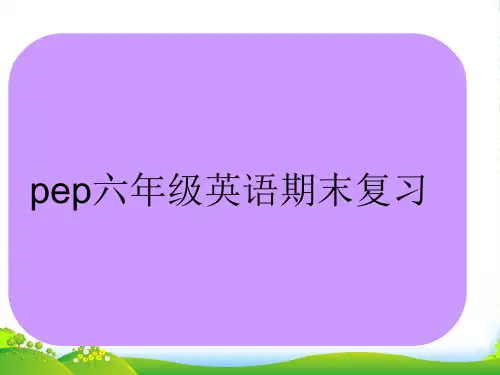
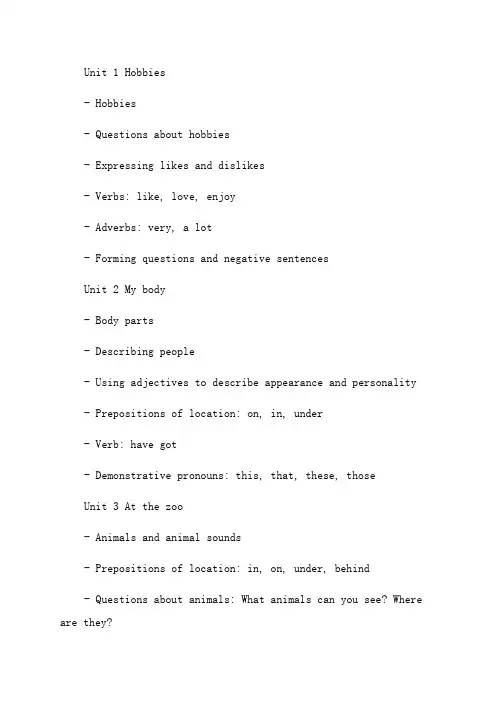
Unit 1 Hobbies- Hobbies- Questions about hobbies- Expressing likes and dislikes- Verbs: like, love, enjoy- Adverbs: very, a lot- Forming questions and negative sentencesUnit 2 My body- Body parts- Describing people- Using adjectives to describe appearance and personality - Prepositions of location: on, in, under- Verb: have got- Demonstrative pronouns: this, that, these, thoseUnit 3 At the zoo- Animals and animal sounds- Prepositions of location: in, on, under, behind- Questions about animals: What animals can you see? Where are they?- Adjectives: big, small, tall, short, long, thin, fat- Singular and plural nouns- Affirmative and negative sentencesUnit 4 At school- School subjects- Classroom objects- Actions: read, write, draw, play, sing, dance, swim, run - Expressing ability: Can you…? Yes, I can. / No, I can’t.- Expressing permission: Can I…? Yes, you can. / No, you can’t.- Ordinal numbers: first, second, third, etc.Unit 5 My house- Rooms in a house- Furniture and household objects- Prepositions of location: in, on, under, behind, next to, in front of- Questions about rooms and furniture: Is there a…? Are there any…?- There is / There are- Adjectives: big, small, old, new, clean, dirtyUnit 6 At the park- Activities at the park: walk, run, play, ride, climb, swing, slide- Prepositions of location: in, on, under, behind, in front of, next to- Questions about activities: What can you do at the park? Where can you…?- Expressing preferences: I prefer… / I don’t like…Unit 7 In the mountains- Geographical features: mountain, river, lake, valley- Activities in the mountains: hike, climb, swim, fish, take photos- Prepositions of location: in, on, under, behind, in front of, next to- Questions about activities: What can you do in the mountains? Where can you…?- Verb: can- Expressing preferences: I prefer… / I don’t like…Unit 8 In Beijing- Places in Beijing: the Great Wall, the Forbidden City, Tiananmen Square- Activities in Beijing: visit, walk, take photos, climb, buy souvenirs- Prepositions of location: in, on, under, behind, in front of, next to- Questions about places and activities: What can you do in Beijing? Where can you…?- Modal verb: can- Expressing preferences: I prefer… / I don’t like…Unit 9 Food and drinks- Food and drinks- Expressing likes and dislikes about food and drinks- Countable and uncountable nouns- Quantifiers: a glass of, a cup of, a bowl of, some- Adjectives: hot, cold, sweet, salty, sour, delicious, tastyUnit 10 Favourite sports- Sport names- Expressing likes and dislikes about sports- Sports equipment- Questions about sports: What sports do you like? What sports can you play?- Verbs: play, do- Expressing abilities: I can… / I can’t…Unit 11 Time for fun- Months and seasons- Expressing likes and dislikes about activities in different seasons- Ordinal numbers: first, second, third, etc.- Adjectives: sunny, cloudy, rainy, snowy, cold, hot, warm, cool- Present simple tense: I read/write/draw…Unit 12 Holidays- Holidays and holiday activities- Questions about holidays: What holiday is in…? What can you do during…?- Adjectives: long, short, fun, boring, interesting- Expressing future plans: I am going to… I will…- Expressing preferences: I prefer… / I don’t like…总结:这个提纲包含了人教版六年级上册所有的重点内容,可以帮助学生复习整个上学期所学的知识点。
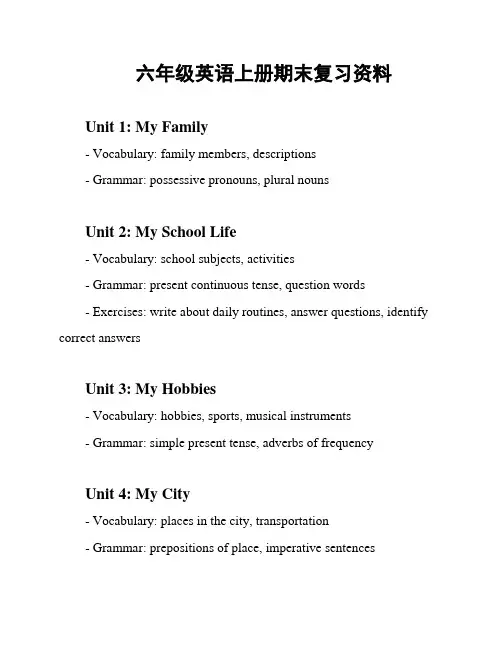
六年级英语上册期末复习资料Unit 1: My Family- Vocabulary: family members, descriptions- Grammar: possessive pronouns, plural nounsUnit 2: My School Life- Vocabulary: school subjects, activities- Grammar: present continuous tense, question words- Exercises: write about daily routines, answer questions, identify correct answersUnit 3: My Hobbies- Vocabulary: hobbies, sports, musical instruments- Grammar: simple present tense, adverbs of frequencyUnit 4: My City- Vocabulary: places in the city, transportation- Grammar: prepositions of place, imperative sentences- Exercises: describe a city, fill in the blanks with prepositions, give directionsUnit 5: Celebrations- Vocabulary: holidays, traditionsUnit 6: Food and Drink- Vocabulary: fruits, vegetables, meals- Grammar: countable and uncountable nouns, imperatives- Exercises: describe favorite food, fill in the blanks with countable or uncountable nouns, give instructionsUnit 7: The Animal World- Vocabulary: animals, habitats- Grammar: present simple tense, subject-verb agreementUnit 8: Our Environment- Vocabulary: nature, pollution, recycling- Grammar: modal verbs, future tense- Exercises: write about ways to protect the environment, fill in the blanks with modal verbs, choose correct future tenseUnit 9: Travel Adventures- Vocabulary: transportation, countries, landmarks- Grammar: present perfect tense, question formationUnit 10: Health and Fitness- Vocabulary: body parts, healthy habits, sports以上是六年级英语上册期末复习资料的大纲。
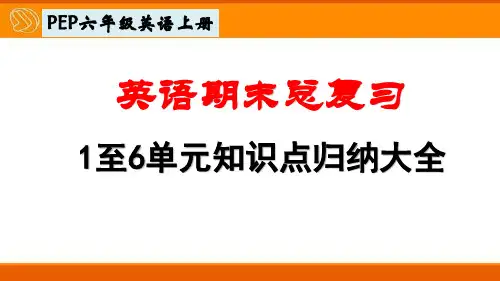
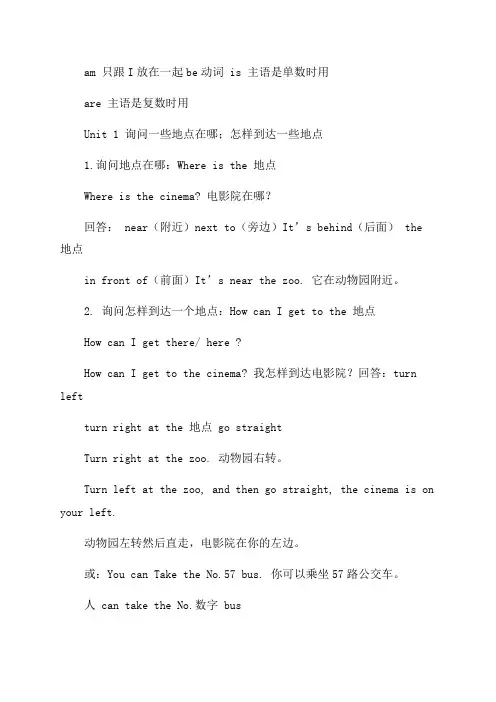
am 只跟I放在一起be动词 is 主语是单数时用are 主语是复数时用Unit 1 询问一些地点在哪;怎样到达一些地点1.询问地点在哪:Where is the 地点Where is the cinema? 电影院在哪?回答: near(附近)next to(旁边)It’s behind(后面) the 地点in front of(前面)It’s near the zoo. 它在动物园附近。
2. 询问怎样到达一个地点:How can I get to the 地点How can I get there/ here ?How can I get to the cinema? 我怎样到达电影院?回答:turn leftturn right at the 地点 go straightTurn right at the zoo. 动物园右转。
Turn left at the zoo, and then go straight, the cinema is on your left.动物园左转然后直走,电影院在你的左边。
或:You can Take the No.57 bus. 你可以乘坐57路公交车。
人 can take the No.数字 busUnit2 到达一些地点的交通方式doesHow do you go to school? 你怎么去学校?回答:人 go(goes) to school by 交通工具I go to school on foot. She goes to school by bus.2.人 must 动词原形人必须……People on bikes must wear one. 骑自行车的人必须戴一个。
I must pay attention to the traffic lights. 我必须注意交通信号灯。
Unit3 人打算做事1.人 be going to do(动词原形) 人打算(或将要)去做事She is going to see a film. 她打算去看电影。
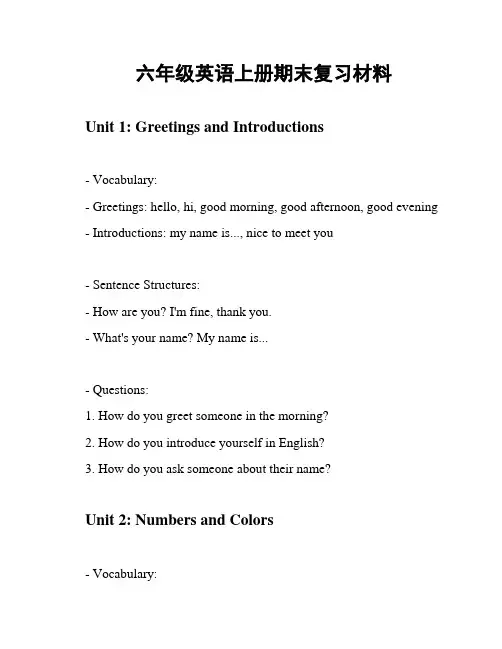
六年级英语上册期末复习材料Unit 1: Greetings and Introductions- Vocabulary:- Greetings: hello, hi, good morning, good afternoon, good evening - Introductions: my name is..., nice to meet you- Sentence Structures:- How are you? I'm fine, thank you.- What's your name? My name is...- Questions:1. How do you greet someone in the morning?2. How do you introduce yourself in English?3. How do you ask someone about their name?Unit 2: Numbers and Colors- Vocabulary:- Numbers: one, two, three, four, five, six, seven, eight, nine, ten - Colors: red, blue, green, yellow, orange, purple- Sentence Structures:- How many...?- The color is...- Questions:1. How do you ask someone about the quantity of something?2. How do you say the color "red" in English?Unit 3: Family and Friends- Vocabulary:- Family: father, mother, brother, sister, grandfather, grandmother - Friends: friend, best friend- Sentence Structures:- This is my...- He/She is my...- Questions:1. How do you introduce your father in English?2. How do you say "best friend" in English?...*Note: This document provides a general overview of the key concepts covered in the sixth grade English textbook. For a more detailed review, please refer to the individual unit materials and exercises.*。
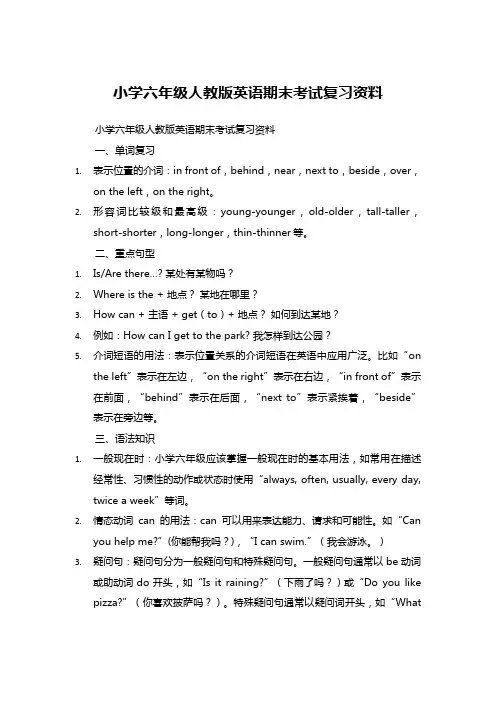
小学六年级人教版英语期末考试复习资料小学六年级人教版英语期末考试复习资料一、单词复习1.表示位置的介词:in front of,behind,near,next to,beside,over,on the left,on the right。
2.形容词比较级和最高级:young-younger,old-older,tall-taller,short-shorter,long-longer,thin-thinner等。
二、重点句型1.Is/Are there…? 某处有某物吗?2.Where is the + 地点?某地在哪里?3.How can + 主语 + get(to)+ 地点?如何到达某地?4.例如:How can I get to the park? 我怎样到达公园?5.介词短语的用法:表示位置关系的介词短语在英语中应用广泛。
比如“onthe left”表示在左边,“on the right”表示在右边,“in front of”表示在前面,“behind”表示在后面,“next to”表示紧挨着,“beside”表示在旁边等。
三、语法知识1.一般现在时:小学六年级应该掌握一般现在时的基本用法,如常用在描述经常性、习惯性的动作或状态时使用“always, often, usually, every day, twice a week”等词。
2.情态动词can的用法:can可以用来表达能力、请求和可能性。
如“Canyou help me?”(你能帮我吗?),“I can swim.”(我会游泳。
)3.疑问句:疑问句分为一般疑问句和特殊疑问句。
一般疑问句通常以be动词或助动词do开头,如“Is it raining?”(下雨了吗?)或“Do you like pizza?”(你喜欢披萨吗?)。
特殊疑问句通常以疑问词开头,如“Whattime is it?”(现在几点了?)或“Where are you going?”(你要去哪里?)。
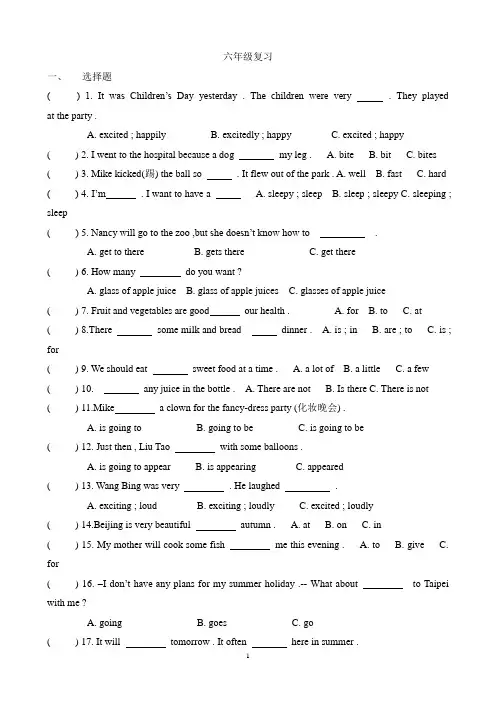
六年级复习一、选择题( ) 1. It was Children’s Day yesterday . The children were very . They played at the party .A. excited ; happilyB. excitedly ; happyC. excited ; happy( ) 2. I went to the hospital because a dog my leg . A. bite B. bit C. bites ( ) 3. Mike kicked(踢) the ball so . It flew out of the park . A. well B. fast C. hard ( ) 4. I’m. I want to have a A. sleepy ; sleep B. sleep ; sleepy C. sleeping ; sleep( ) 5. Nancy will go to the zoo ,but she doesn’t know how to .A. get to thereB. gets thereC. get there( ) 6. How many do you want ?A. glass of apple juiceB. glass of apple juicesC. glasses of apple juice( ) 7. Fruit and vegetables are good our health . A. for B. to C. at ( ) 8.There some milk and bread dinner . A. is ; in B. are ; to C. is ; for( ) 9. We should eat sweet food at a time . A. a lot of B. a little C. a few ( ) 10. any juice in the bottle . A. There are not B. Is there C. There is not ( ) 11.Mike a clown for the fancy-dress party (化妆晚会) .A. is going toB. going to beC. is going to be( ) 12. Just then , Liu Tao with some balloons .A. is going to appearB. is appearingC. appeared( ) 13. Wang Bing was very . He laughed .A. exciting ; loudB. exciting ; loudlyC. excited ; loudly( ) 14.Beijing is very beautiful autumn . A. at B. on C. in( ) 15. My mother will cook some fish me this evening . A. to B. give C. for( ) 16. –I don’t have an y plans for my summer holiday .-- What about to Taipei with me ?A. goingB. goesC. go( ) 17. It will tomorrow . It often here in summer .A. rainy ; rainB. rain ; rainingC. rain ; rains( ) 18. Thank you for to me . A. write B. writing C. to write( ) 19. They are making plans the New Year party. A. at B. with C. for( ) 20. There a fashion show at school next Friday. A. are B. will be C. will ( ) 21. A diet is good for your . A. healthy; healthy B. healthy; health C. health ; healthy( ) 22. Su Hai’s grandmother Kitty’s cat .A. takes care ofB. take care ofC. takes care( ) 23.There a pair of shoes and some balls under the bed just now . A. were B. is C. was( ) 24.The boys are talking about the football match .A. excitedB. excitingC. excitedly( ) 25. it often in Jiangsu? A. Does; rainy B. Is; rainy C. Was , rainy( ) 26. Don’t eat sweet food. That’s bad for our teeth.A. too manyB. much tooC. too much( )27.“How can I go home?” asked the girl . A. loud B. sadly C. sad( )28.The children watched an football match.They were all very .A. exciting, excitingB. excited, excitingC.exciting, excited( )29. our city clean, we should do our best. A. Keep B. Keeps C.To keep( )30.Let the worker a hole in the ground. A. make B. made C. makes( )32. games people happy. A. To play, make B. Playing, make C. Playing, makes( ) 33.---What do you do _____ Chinese New Year’s Eve?--- We usually _____ a big dinner with our family.A. on, have B on, are going to have C. in, had( ) 34. All the children are _______ the party. A .exciting with B excited about C. exciting about()35. Trees help__________ the air clean. A. keep B. to keeping C. keeping ()36. There_____ rubbish in the water and the fish ______dead.A. is; areB. are; isC. are, are( ) 37. The ball is the hole, so Sam pours some water the hole. A. in, in B. into, in C. in, into( )38. Can you tell us how __________ the bus stop. A. to get B. get C. to get to( )39.The man walks , but the woman walks . A.fast, slow B.fast, slowlyC. fastly, slowly( )40.Liu Tao plays basketball ,but Mike does .A. bad, good B. badly, good C. badly, well二、用词的适当形式填空1. Butterflies are ________ (beautiful). They like dancing ____________(beautiful).2.How about (fly) a kite this afternoon?3.Lucy (catch) a bird with her father yesterday morning.4. Su Yang (go) to Japan next Monday . She (want) (find) some information aboutthis country .5. It is a (wind) day . We (fly) kites in the park now .6. It often (rain) here in spring .7. Su Hai is good at (sing) .8. (swim) is good for us . It (make) people (health) and strong .9. Tim knows how to cross the street (safe).10. You mustn’t play on the road . It’s not (safe) .11. Miss Li is talking about traffic (safe).12. Why is the bus (stop) again ?13. Ben is a (happy) boy . He always feels ____ (happy)every day . He always laughs (happy) .14. I _________ ( give ) it to Bob yesterday afternoon.15. ______ you _____ (finish) your homework yesterday?16. All the students are very (excite).17. The mouse is saying (quiet) to the lion.18. Liu Tao (have) some (well) (habit) and he (do) (good) at home.20. Liu Tao_________ (finish) his homework late every day.21. The mouse helped the lion (get) out from the net .22. Don’t shout. Your grandpa (read) newspapers in the study23. Fruit and vegetables are (health) food.24. It’s not ________ (safety) to cross the road now.25. To cross the road ________ (safe), we must look for a zebra ________ (cross).26. To keep ________ (safely), you mustn’t run ________ (quick) on the road.27. It’s too ________ (easily). I can work it out ________ (easy).28. Many __________ (child) run on the playground every day.29. They’re all ________ (drive), they _______ (driver) ________( good).30. Last Sunday, my dad (take) my brother to the KFC, he (become) (happy)31. The boy behind me is _________ (write ) a letter.32. Would you like _________ (listen ) to some music ?33. Look , he can ________ (fly ) a kite on the grass.34. _________ your cousin always like _______ (ask ) a lot about Maths?35. My brother often ________ (play ) football at the weekend.36. I _______ (finish) primary school next year.37. Rubbish _________(make ) the water dirty .38. It’s time _________ (have ) lunch.39. There ________(be) three_______(box) on the table just now.40. Listen! The girl __(play) the piano. She__(play) it every afternoon. But she _ (not play) it yesterday afternoon.41. __________(they)classroom is very messy. 42. We’re going to __________(make) cakes tomorrow.43. Miss Li__________(buy) some flowers last Sunday. 44. We _________(should)throw rubbish anywhere.45. She ________(clean)the desks and _________(put)the rubbish in the bin just now.46..I like . I’d like (swim) with Tim after school.47.The jacket fits me (good). 48. Where’s your mother? She ____________(cut) out a dress.49. My mother often tells me ____________ (not watch) too much TV.50. We should practice ____________ (speak) English more.51. Are you busy __________ (plan) the class trip?52. It takes me about half an hour __________ (run) every day.53. This pair of trousers _________ (look) very nice.54. My cousin with his parents _________ (begin) to eat lunch at 11:30am.55. How long does your mother spends fifteen minutes _________ (walk) to school every morning?56. I have fun __________ (study) English. 57. It’s fun __________ (read) comic books.三、按要求完成句子1. Finally, the lion let the mouse go.(改否定句)2. The woman caught the fish with a net.(对划线部分提问)3. Wang Bing always gets up late.(写同义句)4. Tim eats a lot of sweets every day.(对划线部分提问)5. We usually finish our homework before dinner.(用she 替换we 改写句子)6. A monkey woke the tiger up.(改成一般疑问句)7. Sam brings some water quickly.(改成否定句)8. There are some oranges in the basket.(改成一般疑问句,并作否定回答)9. Jack usually has a few cakes for breakfast.(对画线部分提问)e with me.(改否定句)11.There is much milk in the bottle.(对划线部分提问)12. He has a lot of potatoes. (改一般疑问句,作肯定回答)13. Sometimes he watches TV too.(改同义句)14. Tim has five apples every week.(对划线部分提问)15. They must walk fast now.(改写成否定句)16. We must do your homework before dinner. (对划线部分提问)17. She usually takes some food to the classroom. (用yesterday替换often 改写句子)18. He must not watch TV at night,(提问)19. Helen can play the piano well too. (同义句)20.Does Yang Ling have any good habits?(改为陈述句)21. Where did you visit ? (改为同义句)22. Ben saw some public signs in the restaurant . (改为一般疑问句)23. She had an Art lesson this morning .( 用tomorrow morning 改写句子)24. I was in the playground just now .(改为一般疑问句)25. This sign means “No littering”.(对划线部分提问)26.Liu Tao visited his uncle last week .(对划线部分提问)27. Smoke makes the air dirty. (对划线部分提问)28. Tom takes the metro to his factory every day. (改为同义句)29. He went to the supermarket just now. (否定句)30. They are going to make tangyuan.(对划线部分提问)四、翻译(每空不限词数)1.我们用木头做床、椅子和许多其它东西。
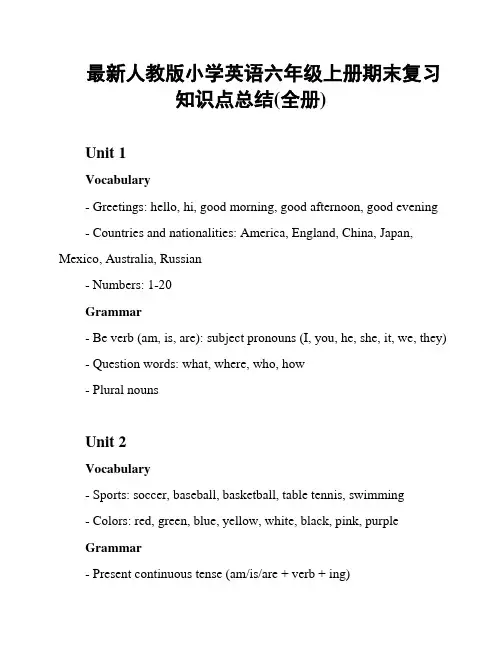
最新人教版小学英语六年级上册期末复习知识点总结(全册)Unit 1Vocabulary- Greetings: hello, hi, good morning, good afternoon, good evening - Countries and nationalities: America, England, China, Japan, Mexico, Australia, Russian- Numbers: 1-20Grammar- Be verb (am, is, are): subject pronouns (I, you, he, she, it, we, they) - Question words: what, where, who, how- Plural nounsUnit 2Vocabulary- Sports: soccer, baseball, basketball, table tennis, swimming- Colors: red, green, blue, yellow, white, black, pink, purpleGrammar- Present continuous tense (am/is/are + verb + ing)- Demonstrative pronouns (this, that, these, those)Unit 3Vocabulary- Subjects: math, English, Chinese, science, music, art, P.E.- School items: pens, pencils, books, rulers, erasers, pencil cases, backpacksGrammar- Can (ability): affirmative, negative, and interrogative forms- Frequency adverbs: always, usually, sometimes, neverUnit 4Vocabulary- Food: bread, noodles, eggs, rice, dumplings, ice cream- Fruits: apples, bananas, oranges, grapes, strawberries, watermelonsGrammar- Countable and uncountable nouns- How much (asking about quantity for uncountable nouns)- How many (asking about quantity for countable nouns)Unit 5Vocabulary- Weather: sunny, cloudy, windy, rainy, snowy- Seasons: spring, summer, autumn, winterGrammar- Simple present tense: affirmative/negative/interrogative forms - Adverbs of frequency: always, usually, sometimes, neverUnit 6Vocabulary- Animals: cat, dog, rabbit, duck, mouse, bird, monkey- Body parts: head, eye, nose, mouth, ear, hand, footGrammar- There be (there is/there are): affirmative/negative/interrogative forms- Possessive 's: showing ownershipUnit 7Vocabulary- Occupations: teacher, doctor, driver, cook, police officer, singer, dancer- Rooms: living room, bedroom, bathroom, kitchenGrammar- Simple present tense: affirmative/negative/interrogative forms- Prepositions of place: in, on, under, behind, in front ofUnit 8Vocabulary- Transportation: bike, car, bus, train, subway, plane- Directions: left, right, forward, backwardGrammar- Imperative sentencesThis is a summary of key vocabulary and grammar points from each unit in the textbook. Happy studying and good luck on your exams!。
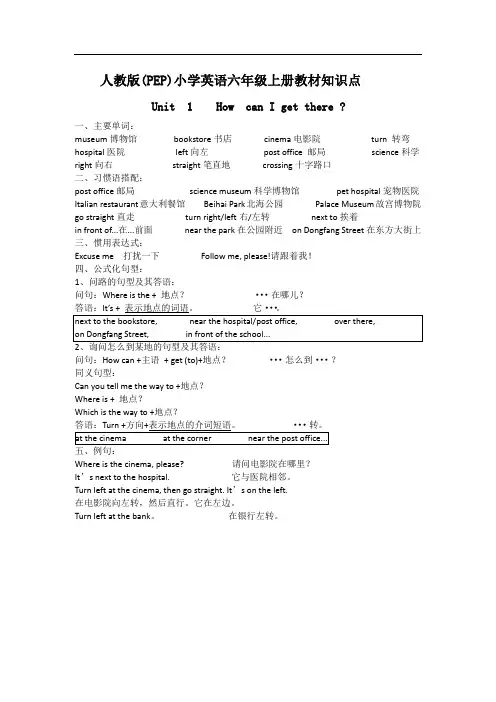
人教版(PEP)小学英语六年级上册教材知识点
Unit 1 How can I get there ? 一、主要单词: museum博物馆 bookstore书店 cinema电影院 turn 转弯 hospital医院 left向左 post office 邮局 science科学 right向右 straight笔直地 crossing十字路口 二、习惯语搭配: post office邮局 science museum科学博物馆 pet hospital宠物医院 Italian restaurant意大利餐馆 Beihai Park北海公园 Palace Museum故宫博物院 go straight直走 turn right/left右/左转 next to挨着 in front of...在...前面 near the park在公园附近 on Dongfang Street在东方大街上 三、惯用表达式: Excuse me 打扰一下 Follow me, please!请跟着我! 四、公式化句型: 1、问路的句型及其答语: 问句:Where is the + 地点? ···在哪儿? 答语:It’s + 表示地点的词语。 它···。 next to the bookstore, near the hospital/post office, over there, on Dongfang Street, in front of the school... 2、询问怎么到某地的句型及其答语: 问句:How can +主语 + get (to)+地点? ···怎么到···? 同义句型: Can you tell me the way to +地点? Where is + 地点? Which is the way to +地点? 答语:Turn +方向+表示地点的介词短语。 ···转。 at the cinema at the corner near the post office... 五、例句: Where is the cinema, please? 请问电影院在哪里? It’s next to the hospital. 它与医院相邻。 Turn left at the cinema, then go straight. It’s on the left. 在电影院向左转,然后直行。它在左边。 Turn left at the bank。 在银行左转。 Unit 2 Ways to go to school 一、主要单词: by乘 bus公共汽车 on foot步行 plane飞机 taxi出租车 ship(大)船 subway地铁 train火车 slow慢的 stop停下 always 总是,一直 usually 通常 often经常 sometimes 有时候 never 从来不 二、习惯语搭配: by bike/bus/plane/subway/train/ship/taxi/ferry 骑自行车/乘公共汽车/飞机/地铁/火车/船/出租汽车/渡轮 take the No.57 bus乘57路公共汽车 on foot步行 slow down慢下来 pay attention to注意 traffic lights 交通信号灯 look right向右看 cross the road横穿马路 get off下车 at home在家 traffic rules交通规则 get to到达 get on 上车 be far from…表示离某地远 三、惯用表达式: Wait!等一等! Hooray太好了! I see. 我明白了。Go at a green light 绿灯行 Stop at a red light 红灯停 Wait at a yellow light 黄灯等 四、公式化句型: 1、如何询问对方的出行方式: How do you come(to)+地点? 你(们)怎么来···的? 2、如何用must表示必须做某事: 某人+must+动词原形(+其它). ···必须···。 3、告诫别人不要做某事的句型: Don’t +动词原形(+其它). .不要/别···。 五、例句: How do you go to school? 你怎么去上学? Usually I go to school on foot. Sometimes I go by bus. 通常我步行去上学。有时候骑自行车去。 How can I get to Zhongshan Park ? 我怎么到达中山公园? You can go by the No. 15 bus. 你可以坐15路公共汽车去。 I am far from school now. 我现在离学校很远。 My home is not far from our school. My home is near our school. 我家离学校不远。 Unit 3 My weekend plan 一、主要单词: tomorrow明天 film电影 supermarket超市trip旅行 tonight在今晚 evening晚上/傍晚 next week下周 comic连环画杂志 dictionary词典 word单词 post card明信片 visit拜访 二、习惯搭配: take a trip去旅行 go for a picnic去野餐 go to the cinema去看电影 learn to swim学习游泳 visit my grandparents看望我(外)祖父母 get together 聚会 go to the supermarket去超市 go ice-skating去滑冰 make a snowman堆雪人 see a film看电影 make mooncakes做月饼 read a poem朗诵一首诗 this weekend这周末 Renmin Park人民公园 next week下周 this morning/afternoon/evening今天上午/下午/晚上 next Wednesday下星期三 三、惯用表达式: What about you?你呢? Here they are!它们在这儿! Can I help you?我能帮助你吗? Sounds great!听起来很棒! Have a good time!玩得开心! You too.你也是 四、公式化句型: 1、询问对方打算做什么的句型及其答语: 问句:What are you going to do +其它? 你/你们···打算做什么? next week tonight tomorrow this morning/afternoon/evening this weekend... 答语: I’m/We’re going to +动词(短语)原形+其它. 我/我们打算···。 see a film take a trip visit my grandparents watch TV... 2、询问对方打算去哪儿的句型及答语: 问句:Where are you going(+将来时间)? 你/你们打算(···)去哪儿? 答语:I’m/We’re going (to the)+地点. 我/我们打算去···。 3、询问对方打算何时去做某事的句型及答语: 问句:When are you going to +动词(短语)原形? 你/你们打算什么时候···? 答语:I’m/We’re going to +动词(短语)原形+将来时间. 我/我们打算···。 五、例句: What are you going to do on the weekend? 你周末打算做什么? I’m going to visit my grandparents this weekend? 这个周末我打算去看望我的外祖父母。 Where are you going this afternoon? 你今天下午打算去哪里? I’m going to the bookstore. 我打算去书店。 What are you going to buy? 你打算去买什么? I’m going to buy a comic book。 我打算去买一本漫画书。 Unit 4 I have a pen pal 一、主要单词: studies学习(第三人称单数形式) puzzle谜 hiking远足 二、习惯搭配: read stories读故事 do kungfu练功夫 fly kites放风筝 play the pipa弹琵琶 play sports进行体育活动 climb mountains爬山 listen to music听音乐 sing English songs唱英文歌 on a farm在一个农场里 live in...住在··· write an email to...给···写一封电子邮件 on the playground在运动场上 三、惯用表达式: Me too.我也是。 Really?真的吗? 四、公式化句型: 1、询问某人爱好的句型及其答语: 问句:What are sb.’s hobbies? ···有什么爱好? 答语:主语+like/likes+动词-ing形式(+其它). ···喜欢···。 singing dancing reading stories playing football doing kungfu doing word puzzles going hiking watching TV drawing cartoons listening to music going fishing 2、由do/does引导的一般疑问句及其答语: 问句:Do/Does+主语+动词原形+其它? 答语:Yes,主语+do/does. /No,主语+don’t/doesn’t. 五、语法: 1、动词变为动名词的规则: 动词变为动名词,即是动词加ing。一般要遵循以下三条规则: (1)一般情况下,在动词的后面直接加ing。如: play—playing read—reading do—doing go—going (2)以不发音的字母e结尾的动词,要去掉不发音的字母e,再加ing。如: write—writing ride—riding make—making dance—dancing (3)以单元音加单辅音结尾的重读闭音节,要双写最后一个辅音字母,再加ing。如: run—running swim—swimming put—putting sit—sitting
六年级上册英语复习知识点Unit1 HowcanIgetthere?一、主要单词:tasty 美味的LondonEye 伦敦眼stomach 胃gostraight=walkstraight 直走nextto 紧挨着/与⋯相邻farfrom(离⋯远)near 在⋯附近behind(在⋯后面)infrontof (在⋯前面)between⋯and⋯(在⋯和⋯之间)hot(反义词)cold cool( 反义词)warm too (同音词)to/twocannot(缩写)can’t right( 反义词)left/wrong buy( 同音词)by/byesea(同音词)see first (基数词)one four( 序数词)fourthdid( 原形)do/does three( 序数词)third give( 过去式)gave二、重点句型分析1、询问“某人或某物在哪里”的基本句型是:“Where+is/are+ 主语?”,whereis 后接名词或代词的单数形式,whereare 后接名词或代词的复数形式。
表示地点的词:museum博物馆,postoffice 邮局,bookstore 电影院,hospital 医院restaurant 餐馆bank银行busstop湖library图书馆zoo动物园school学校park公园garden馆书店,cinema公交车站lake花园hotel旅2. It’snearthedoor.此句中near是表示位置的介词,意为“旁边,附近”,其同义句是:It’s nexttothedoor. 它在门的旁边。
表示位置的短语:nexttothebookstore挨着书店nearthehospital 在医院附近nearthepostoffice 在邮局附近overthere在那边onDongfangStreet在东方大街上infrontoftheschool在学校前面3.Howcanwegetthere?此句用来询问“怎样去某地”,后面直接跟地点。
六年级上册英语期末复习资料
重点词汇、句子
play the violin 拉小提琴 do eye exercises 做眼保健操
play sports 参加体育活动 learn English 学英语
have a rest 休息一下 take out the book 取出书本
right now 立刻 马上 It doesn’t matter.没关系
go out 出去 Of course.当然
It’s time to play the violin. 该拉小提琴了。
I’m afraid you can’t. 恐怕你不能。
always 总是,一直 half 半,一半
past 超过,超出 brush 刷,擦
usually 通常,常常 hour小时
after that 在那之后 take a walk 散步
play ping-pong 打乒乓球 play tennis 打网球
go boating 划船 go skating 滑冰
go shopping 购物 a lot of许多
How often do you drink milk? 你多久喝一次牛奶?
You look healthy. 你看起来很健康。
how often 多久一次 once 一次
twice 两次 study 学习,学业
do well in 在……做得好 run after 追赶
keep healthy 保持健康
How often does Li Shan go skating? 李珊多久滑一次冰?
earth 地球 something 某事,某物
pick 采,摘 waste 浪费
drive 驾驶,开车 think 认为,想
dirty 脏的 more 更多的
care for 关爱,照料 cut down砍伐,把……砍倒
What should I do? 我应该做什么?
Why not go in your dad’s car? 为什么不坐你爸爸的车去呢?
also 也,同样 thing 东西,事物
only 只,仅仅 on the earth 在地球上
shall将要 go on a picnic去野餐
take out of 从……取出 put into 放入,放进……里面
get to抵达,到达 or 还是,或者
meet at the gate 在大门口会合 free 空闲的
Let’s go on a picnic. 让我们一起去野餐吧。
What shall we take? 我们要带什么?
What do you often do on weekends? 你周末经常做些什么?
ask 问,询问 start 开始,启动
answer 回答,答复 hungry 饥饿的
excited 兴奋的,激动的 basket 篮子
What would you like to do? 你想做什么?
get to 到达,抵达 come back 回来,返回
would like to想要 on weekends 在周末
take a photo 拍一张照片 take photos 拍照
scarf 围巾 wallet 钱包
sunglasses 太阳镜 glove 手套
warm jacket 棉夹克 rain boots雨靴
school bag 书包 lost 丢失的
just now 刚才 in front of在……的前面
Where is my raincoat? 我的雨衣在哪里?
It was here just now. 刚刚还在这里。
was是(am,is的过去式) were是(are的过去式)
still 还,仍然 yesterday 昨天
ago 以前 thousand 千
watch a show 看表演 look after 照顾、照看
do housework 做家务 see a friend 看望一个朋友
have a match 比赛 go away 离开
busy 忙碌的
What did you do last weekend?你上个周末做了什么?
It doesn’t matter.没关系。
Sounds great.听起来不错。
I’m sorry to here that.我很遗憾听到这个消息。
do well in……在某方面做的好 make the bed 整理床铺
water the flowers 浇花 cook the meal 做饭
do the homework 做家庭作业 visit the museum 参观博物馆
play beach volleyball 打沙滩排球
Did you go out to play last weekend? 你上周末出去玩了吗?
Where did you go last weekend?你上周末去了哪里?
Sounds interesting.听起来很有趣
I learned to cook and make a big cake by myself.
我学了烹饪,并亲手做了一个大蛋糕。
Beijing duck 北京烤鸭 the Great Wall 长城
summer holiday 暑假 go with 和……一起去
for three days 三天 tell a joke 讲笑话
win a gift 赢得礼物 play the guitar 弹吉他
funny 搞笑的 think of 认为,思考
act a play 演话剧
What do you think of our party? 你认为我们的聚会怎么样?
It was great.它很棒。
Did you play games at the party? 你们在聚会上做游戏了吗?
I think everyone had a good time. 我认为每个人都玩的很开心。
at the beginning 开始,起初 have a party 举办聚会
Everything is ready.一起准备就绪。
It made many students cry.它(短剧)使许多同学哭了起来。
There were many colorful lights and balloons in it.
它(教室)里面有许多彩灯和气球。